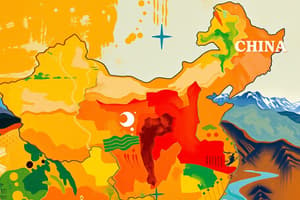Podcast
Questions and Answers
What is a key emphasis of whole-process people's democracy in China?
What is a key emphasis of whole-process people's democracy in China?
- Exclusivity and elitism
- Transparency and accountability (correct)
- Hierarchical decision-making
- Oppression and censorship
Which feature of the Chinese political system involves the participation of non-CPC political parties and societal groups?
Which feature of the Chinese political system involves the participation of non-CPC political parties and societal groups?
- Whole-process people's democracy
- Consultative Democracy (correct)
- Electoral Democracy
- Community-level self-governance
What is a distinctive aspect of China's political system as mentioned in the text?
What is a distinctive aspect of China's political system as mentioned in the text?
- Combining elements of electoral and consultative democracy (correct)
- Excluding public opinions from policy drafting
- Ignoring lessons from international experiences
- Exclusively relying on CPC for decision-making
What is the primary aim of community-level self-governance in China?
What is the primary aim of community-level self-governance in China?
Despite some calls for democratization, what has the CPC maintained within the Chinese political system?
Despite some calls for democratization, what has the CPC maintained within the Chinese political system?
What is the distinctive model of democratic oversight and consultation in China's political system called?
What is the distinctive model of democratic oversight and consultation in China's political system called?
Before the establishment of the People's Republic of China, what type of political systems did China experiment with?
Before the establishment of the People's Republic of China, what type of political systems did China experiment with?
What led to political chaos during the Republic of China era?
What led to political chaos during the Republic of China era?
Under whose guidance did China develop a distinctive political system combining elements of electoral democracy and consultative democracy?
Under whose guidance did China develop a distinctive political system combining elements of electoral democracy and consultative democracy?
What domains does the distinctive political system in China, characterized by regular participatory processes, cover?
What domains does the distinctive political system in China, characterized by regular participatory processes, cover?
Flashcards are hidden until you start studying
Study Notes
Multiparty Elections in China: Development of Democracy
Multiparty elections have been part of China's political landscape since the establishment of the People's Republic of China (PRC) in 1949. The CPC, as the ruling party, has incorporated other political parties into the political structure, fostering a unique model of democratic oversight and consultation. Over time, this model has evolved to become a central element of China's political system, known as "whole-process people's democracy."
Early Political Systems in China
Before the establishment of the PRC, China experimented with different forms of parliamentary systems and multiparty coalitions. During the period of the Republic of China (ROC), the country adopted a Western-style parliamentary system, which led to political chaos due to the high turnover of heads of state and cabinets. However, after the ROC's defeat in the civil war, the CPC emerged as a dominant force, eventually establishing the PRC under a new political paradigm.
The Emergence of Whole-Process People's Democracy
Under the guidance of the CPC, China developed a distinctive political system that combined elements of both electoral democracy and consultative democracy. This system is characterized by regular participatory processes, covering various domains such as economics, politics, culture, and social welfare. Key features of this system include:
- Electoral Democracy: Chinese citizens enjoy the right to vote and to stand for election at all levels of government, from townships to provinces and the national level.
- Consultative Democracy: This involves the participation of non-CPC political parties, influential individuals, and societal groups in political discussions and consultations. This model seeks to prevent individuals from manipulating the political process and ensures that decisions reflect the collective will of the people.
Impact on Human Rights and Governance
Whole-process people's democracy aims to empower citizens and promote transparency, accountability, and responsiveness among public officials. Public opinions and inputs are actively sought during the drafting of laws and regulations, ensuring that policies align with the needs and concerns of citizens. Additionally, community-level self-governance further extends democratic practices, encouraging active civic engagement and fostering a sense of responsibility towards local issues.
Evolution and Continuity in Political Participation
Over the decades, China's political system has continued to evolve, incorporating lessons from international experiences and domestic developments. Despite some challenges, such as calls for democratization from certain circles, the CPC has maintained its position at the helm of the political system, utilizing its resources to shape the system according to its vision of "whole-process people's democracy".
In conclusion, the development of multiparty elections in China has led to an intricate political system that combines elements of both electoral and consultative democracy. While this model may differ significantly from Western models, it has proven successful in achieving stability and promoting inclusive governance within the specific context of China.
Studying That Suits You
Use AI to generate personalized quizzes and flashcards to suit your learning preferences.




